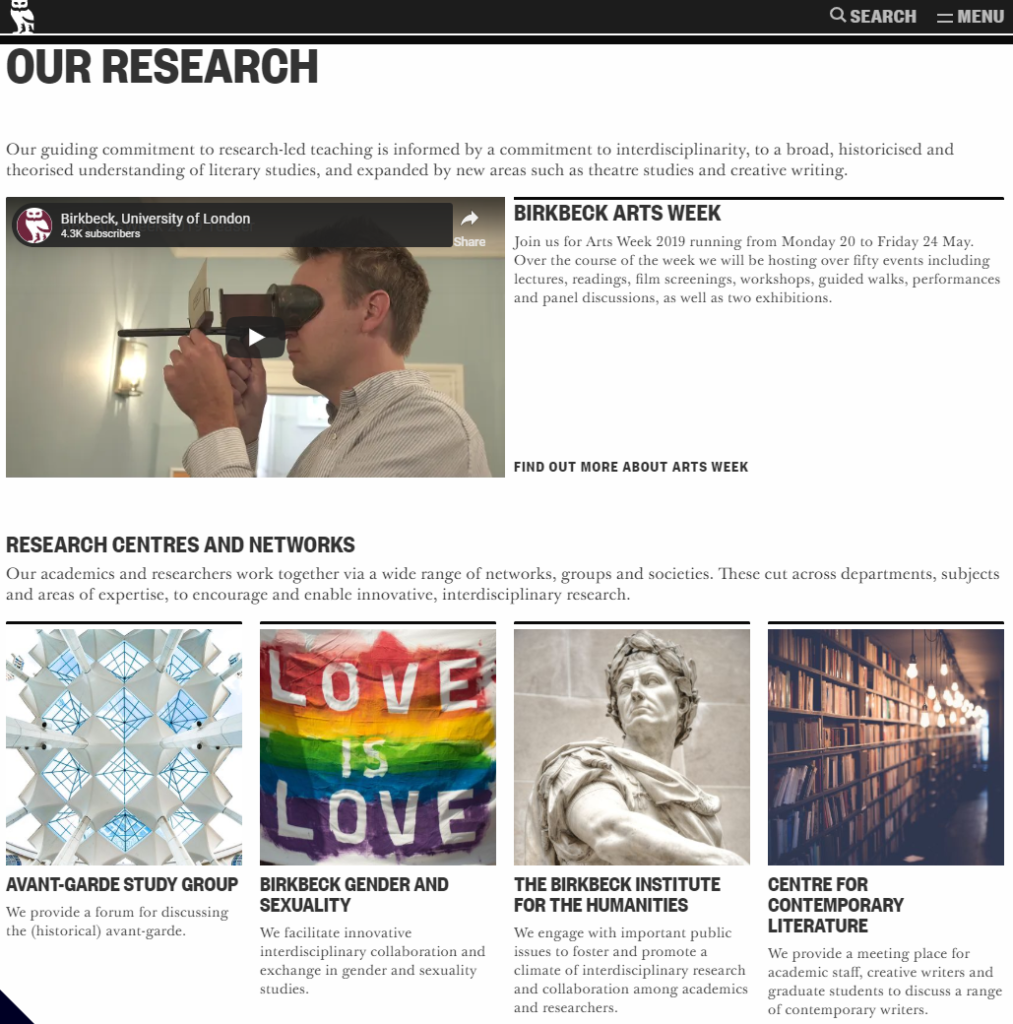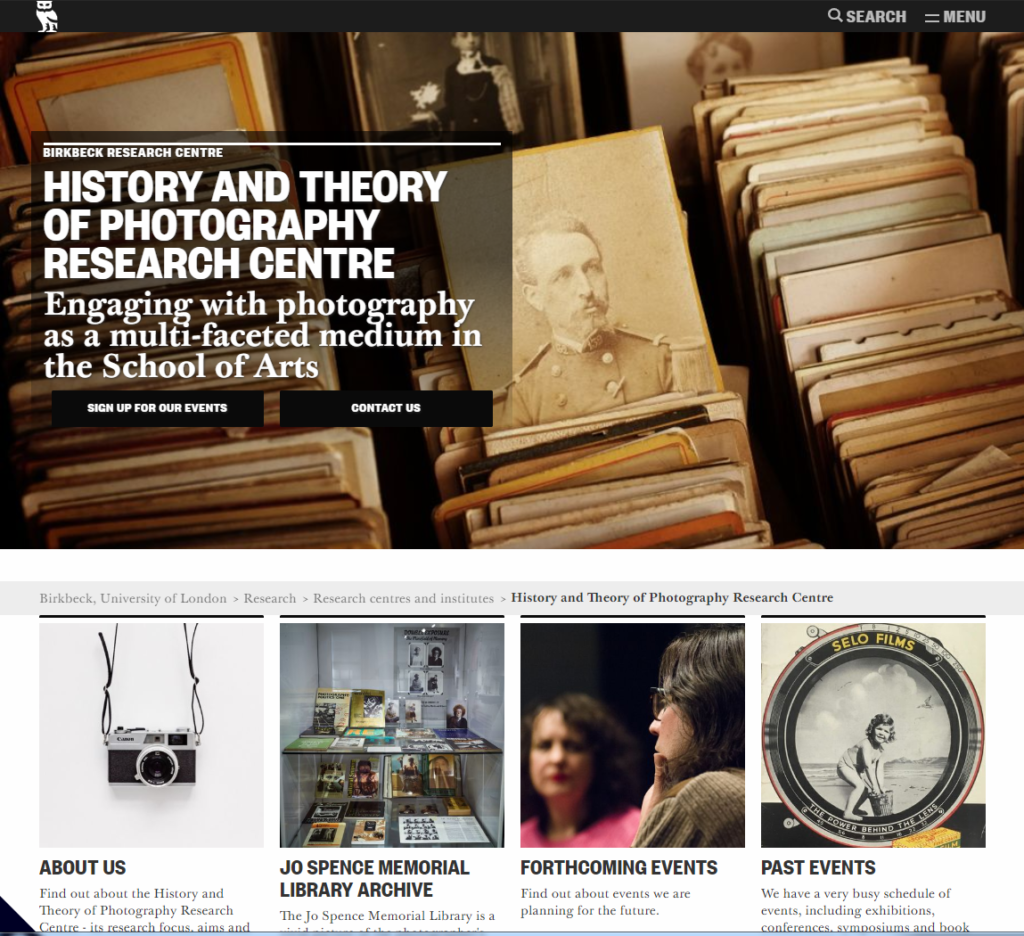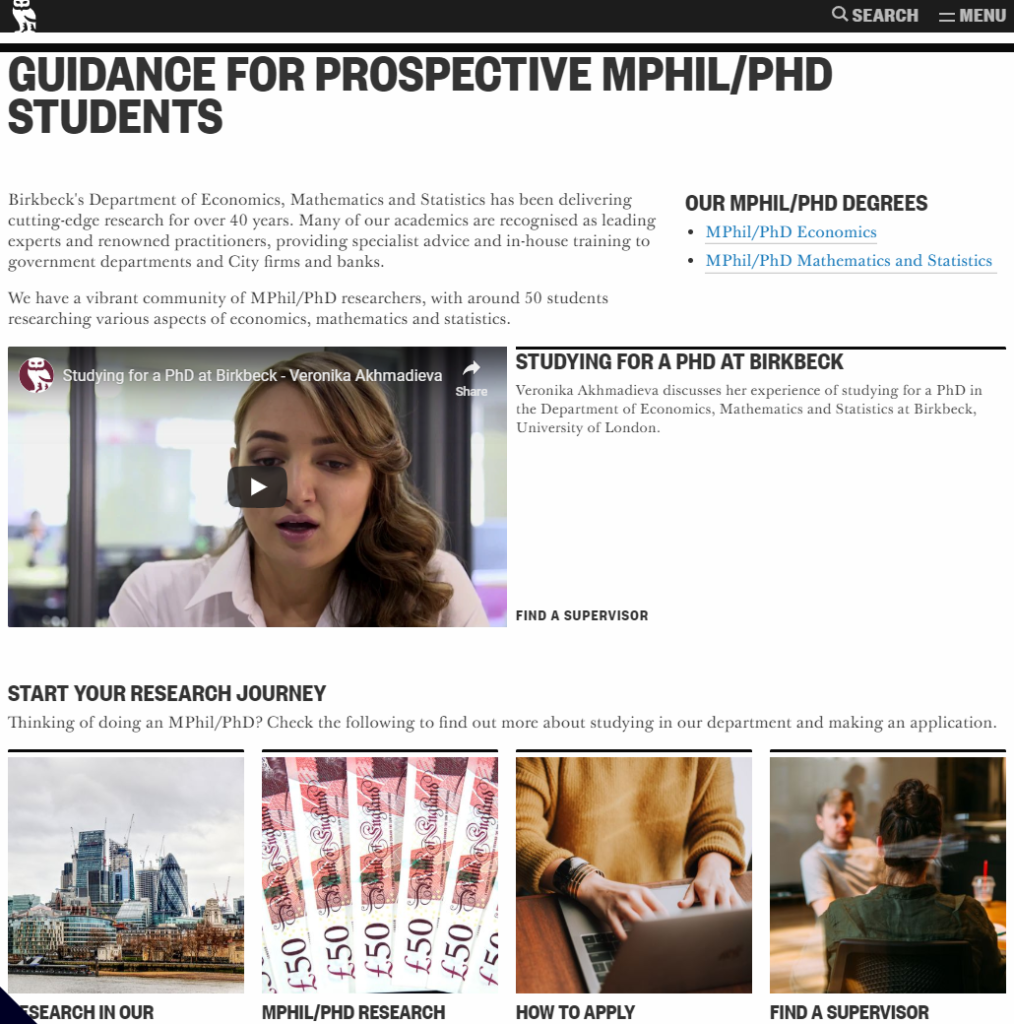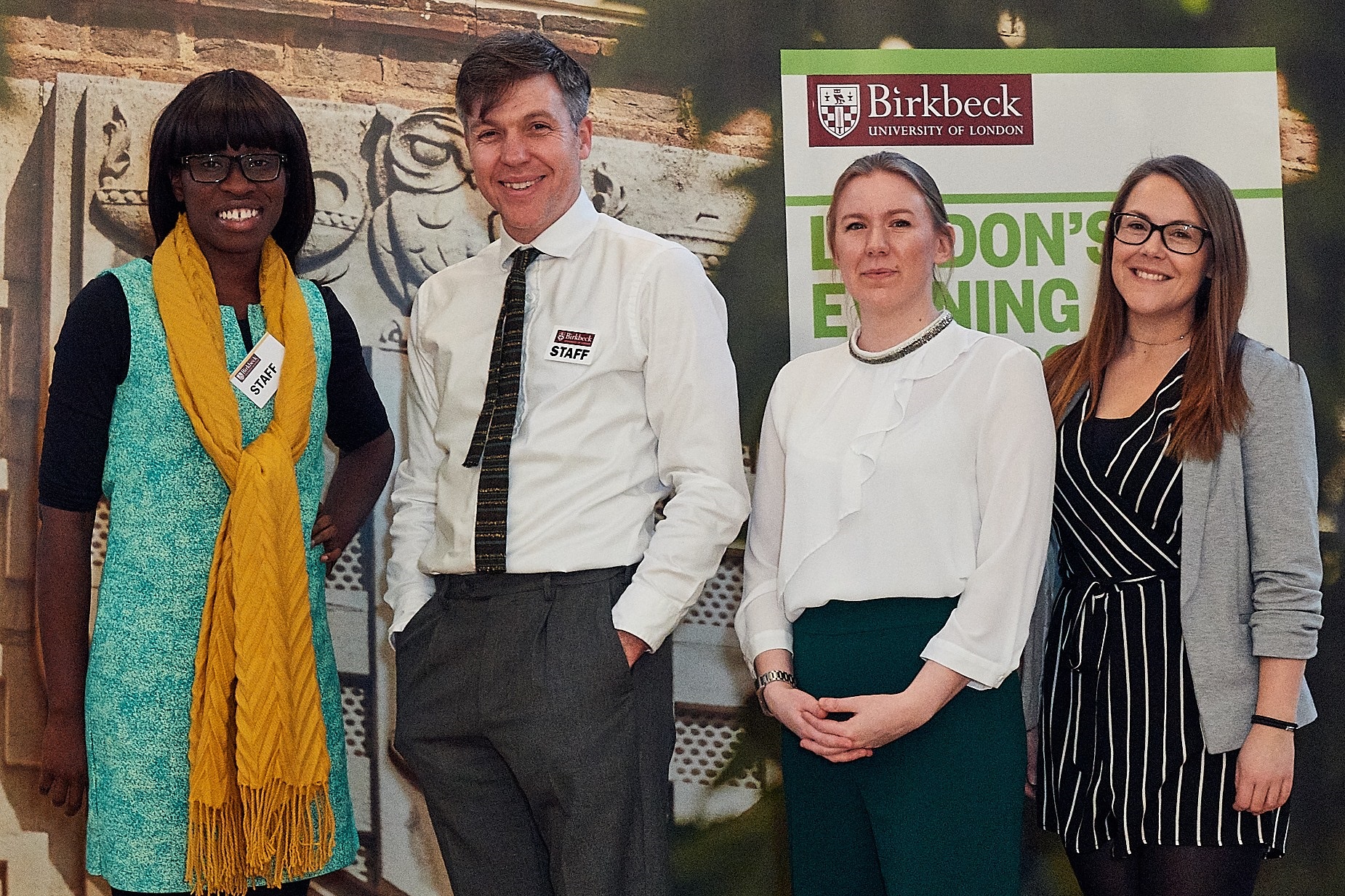Birkbeck’s digital team is upgrading the Birkbeck school/department web presence, to provide entirely new, refreshed content, including new images, and improved navigation. With five school sites, 18 department sites, 21 microsites and over 32,000 content items – pages, images, files, events and news stories – all of which need to be reviewed and upgraded – this is a huge undertaking.
Jane Van de Ban, Digital Content Lead, tells us about the latest developments.

Following a directive issued by the college’s Web Working Group, we have prioritised department-related research content. We are pleased to report that, with the latest release, this project has now (almost) been completed.
What’s new?
We have done a lot to get us to this point, namely:
- New annual event and event series information
Our schools and departments offer a vibrant calendar of recurring public events, from school weeks, to annual memorial lectures, to seminar series and more. Most (if not all) of these events are free to the public and showcase the huge range of research that is undertaken by our academics. But it hasn’t always been easy to find out about the full range, as our events calendar is packed, and the information was scattered across our website, siloed on separate department sites.
We have brought this information together and make it far easier for the public to see these events.
Want to see more?
- Annual events and event series wayfinding page http://www.bbk.ac.uk/annual-events/
- Arts Week
- Law on Trial
- Science Week
Don’t see your event series? If you are a member of staff and responsible for either an annual event or event series, hosted by Birkbeck, please raise a query on Ask, so we can investigate.
- Updated research centre content
We know how central research centres are to the research activity undertaken by our departments.
You can find information on a number of research centres in places other than the Birkbeck website – which means they are out of scope for the Digital Transformation project. But where we found research centre content hosted on either school or department pages, we knew we could present this key information better. We redeveloped these (which also involved migrating publications information into BIROn and events information into the events calendar), got them checked and signed off by content owners, and then put them live.
2.1 Want to see more?
- Peltz Gallery
- Birkbeck Centre for Applied Macroeconomics
- History and Theory of Photography Research Centre
Need a new research centre web page? If you are a member of Birkbeck staff and want to talk to us about getting a research centre resource like the ones shown here, please raise a query on Ask in the first instance and direct it to Ollie Berman.

- Research networks, groups and societies
All our schools and departments facilitate networks of academics with common interests, which are less formal associations than research centres – but are identified by a range of names (clusters, groups, societies, etc.).
It is clear that, even with different names, these networks have a lot in common, in that they provide a focus for specific research activity. Because of their similarities, we decided to bring them together and provide much more targeted, bespoke pages to highlight what they do.
3.1 Examples
- Academic networks wayfinding page: http://www.bbk.ac.uk/research/networks/
- Eighteenth-Century Research Group http://www.bbk.ac.uk/research/networks/eighteenth-century-research-group
- Geo-Analytics Modelling Group http://www.bbk.ac.uk/research/networks/geo-analytics-and-modelling-group/
- Macroeconomics Research Group http://www.bbk.ac.uk/research/networks/macroeconomics-research-group
- Guidance for prospective MPhil/PhD students
We know, from analyses we have done on how people use the web, that prospective MPhil/PhD students are more likely than any other student group to look at pages on department sites. And we found that a number of departments provided guidance to help these students in their recruitment journey.
We have created bespoke wayfinding pages for prospective MPhil/PhD students, which give easy access to a range of sources of advice and guidance. In addition, where we found them, we have embedded relevant department videos providing targeted advice to help these students or provide an insight into department research.
In most cases, these pages not only replace but improve on existing content on department sites, and those pages have been redirected to this new content.
4.1 Want to see more?
- Department of English and Humanities’ Guidance for propectiveMPhil/PhD students http://www.bbk.ac.uk/departments/english/prospective-phd-guidance/
- Department of Economics, Mathematics and Statistics’ Guidance for prospective MPhil/PhD students http://www.bbk.ac.uk/departments/ems/prospective-phd-guidance
- New research wayfinding pages
There are two main reasons for visitors to look at academic department content: to find out about the staff and to find out about the department’s research. We know this, because for years we have been monitoring the way people use the Birkbeck website – staff and research always come top when it comes to the departments. But, having analysed the research content on our department sites, we know that we have not always made it easy for visitors to understand what research means for individual departments.
Building on the work we’ve done throughout this project and as the final big task in this stage of the Digital Transformation Project, therefore, we have now created research wayfinding pages for our academic departments (with the exception of Computer Science, which is out of scope for this project, and the School of Science, because we ran out of time to complete their pages). Now, when you select ‘research’ on a department wayfinding page, you will find pages that:
- showcase the full range of research centres and networks department academics belong to (including interdisciplinary working groups)
- provide easy access to related research information, like department staff pages, staff research interests, department publication lists (on BIROn) and the support offered to staff by the Birkbeck research office
- signpost department-specific event listings, so visitors will find it easy to sign up for your next event.
As with all our wayfinding pages, these pages can expand and contract, as new research initiatives or sources of information come onstream or end.
5.1 Have a look
- Department of Criminology http://www.bbk.ac.uk/departments/criminology/our-research/
- Department of English and Humanities http://www.bbk.ac.uk/departments/english/our-research/
- Department of Organizational Psychology http://www.bbk.ac.uk/departments/orgpsych/our-research
- What you won’t find
In analysing the current content to inform our redevelopment work, we have realised that some of our public content is problematic. So, mostly, you won’t find the following – and I’ll explain why:
6.1 Duplicate course information
Some departments have long included course descriptions on their sites – and we understand that this stems from a desire to ensure that our prospective students have as much information as they need to make the right decision about studying. But having course information on department sites is problematic, because:
- If content is included in more than one place (ieit is ‘duplicate’ content), it will get out of sync (because it represents an additional maintenance load), and we run the risk of providing inaccurate information, with no way for prospective students to gauge which is the correct source. For example, in analysing the content currently located on department sites, we found information provided on more than 12 degrees that are no longer offered. (On the course listings, programmes that are withdrawn are automatically taken down through an existing workflow.)
- The Competitions and Market Authority (CMA) requires universities to provide accurate and complete course information to prospective students (https://www.gov.uk/government/news/cma-advises-universities-and-students-on-consumer-law). We have always aimed to ensure that our course information is both up-to-date and accurate: we do that better if course descriptions are only located in one place.
- We know where people look for information on our site, as we monitor usage through Google Analytics. So, we know that prospective students don’t expect to find the information on department sites – they look at our course listings for course information. Providing key information elsewhere makes it harder, not easier, for them to ensure they have all the information they need.
- Duplicate content pages undermine the ability of users to find course information, because – if Google perceives what they consider to be content that is substantively the same, they will only show one of the pages in their results. Having one destination improves the ability of external visitors to find all their course information through search.
For all of these reasons, we have taken the decision to remove this duplicate content from public view and ensure we have a ‘single source of truth’ in our course listings. To this end, we have reviewed the course information on department sites and integrated all ‘added-value’ information into our course descriptions. And we have now redirected department course information to the course pages, so the department course pages are no longer publicly accessible.
6.2 Information on current MPhil/PhD students
A number of departments include information on their current MPhil/PhD students. We understand how important this information is to our colleagues in departments. However, in looking at this information, we found that very many of these ‘current’ students are no longer current – having completed their degrees, in some cases, years ago. Moreover, we are now subject to GDPR regulations, which stipulate that we need to have proof of explicit consent where we publish personal information.
To ensure we are GDPR-compliant in relation to PhD students will involve a significant amount of work and effort, something we don’t have the resources to address. However, there are plans in the pipeline – once our new academic staff profiles go live – to expand the new resource to include PhD student profiles.
Considering all this, we have therefore taken the decision to remove this content from public view by redirecting these pages to new information. And, in the meantime, we have signposted the ORBIT resource, where you can read published PhD theses for each department.

Updates? If your course description needs to be updated, you should contact the Digital Publications Officer in External Relations, who can help you.
6.3 Current research projects
Birkbeck is, quite rightly, proud of its research reputation and the world-class research that is undertaken by our academics. But, right now, we’re not showcasing this as well as we could. Our academics are engaged in a huge range of research projects – both funded and unfunded – covering the breadth of the disciplines, but if you look at our website, it seems we are only telling people about a fraction of this work.
We know people want to know about our research – in a recent survey of alumni, for example, 38% of respondents told us that this is precisely the information they want to read. And our Development team tells us that potential funders want to know about the research our academics undertake and how it will contribute to society. For these reasons, we are developing new research project overviews, curated and developed by professional writers, to ensure that we provide a good introduction to this important area of our research work.
This work is ongoing, and we will be in touch. In the meantime, we have removed current research project information on department sites from public view (as much of it referred to completed research projects).
Where we have found information on current research activity hosted on external sites, we have signposted them – but this is an area that will be developed further.
6.4 Local event information
In analysing department research information, we found detailed event information all over the place – and, in most cases, it was out of date, yet still being presented as a future event.
Detailed event information needs to be included in the Birkbeck events calendar, *not* on local content pages. This makes it easier for your audience to find this information – and also means that you will retain the details for future reference.
If you need to publicise an event, you can enter your event details in the events system in My Birkbeck for Staff.
6.5 Journal articles
We have to stop using the Birkbeck website as a file repository, because it slows it down and causes usability problems.
All journal articles, conference proceedings, working papers, etc. need to be included in BIROn – which will make it easier for people to find this important collateral.
If you need help with this, please contact Paul Rigg for information and support.
- Future content developments
The aim of this stage of the Digital Transformation Project is, ultimately, to take down all of the remaining school and department pages. Future content to go live includes:
- Information on labs: We have developed new lab pages for the School of Science, replacing existing content on school and/or department sites. These new pages are being checked and, once approved, should go live on our site, replacing the current pages (many of which are out of date).
- Research project overviews (see above).
- Revised PhD funding information: Currently, it is impossible to find the full breadth of PhD funding available to our students. In this project, we aim to make that experience easier and have developed a resource to improve the prospective student experience. This is due to be sent out for approval and checking, after which we will replace all of the current PhD funding information on department sites and redirect them to new pages.
- Prospective student information: We need to ensure that prospective students who come to department sites can find relevant information as quickly and helpfully as possible. We will be working on this project, once we’ve had a chance to finalise the research offering.
- Remaining information on department sites:To enable us to finally take down the department microsites, we will do a final sweep of all of the remaining content and either develop replacement content or jettison it, depending on its currency and value.
- School web presence: All of our school sites need to replaced. What that looks like and the function they meet is yet to be determined, following consultation with relevant staff.
- Related / future projects
Other projects that are either being undertaken or are in the pipeline include:
- SSL: We need to implement improved security on our public-facing web. SSL will deliver this and is in the process of being added to our site (you will know when that change has happened because our URL will change to https://www.bbk.ac.uk/).
- New and improved search: Our course search and site search are being replaced by Funnelback.
- New academic staff profiles: Following extensive consultation, our academic staff profiles are being improved. All being well, these will go live during the summer.
- Research student profiles: Once our academic staff profiles are in place, we can look to develop profiles for our PhD students.
- Sharepointproject: External Relations and ITS have launched a joint project to improve access to our staff-facing information, using Sharepoint.
You will find out more about these and other projects as they develop, as we will aim to publish information here on them.
- Project team changes
Jane Van de Ban, Digital Content Manager, and Dr Ben Winyard, Senior Content Editor, are leaving Birkbeck, after a number of years.
It has been a pleasure to work on the Birkbeck website and we look forward to seeing how it develops in future.
If you have queries about the Birkbeck website, please contact Ollie Berman (o.berman@bbk.ac.uk), Head of Communications, in the first instance.
. Reply . Category: Professional Services


